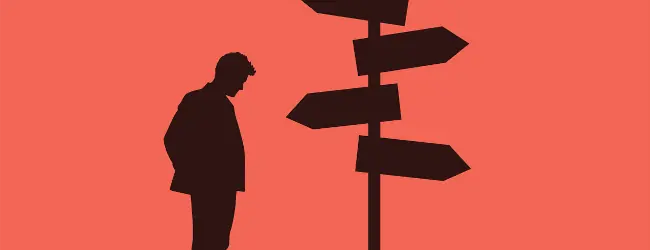My recent theme is how to relax more. I wanted it for a long time, and unexpectedly, rationality provided it to me.
Relaxation, rationality, and meaninglessness are closely associated. Let’s talk about it.
How to reduce fear and anxiety
Sometimes, we want to reduce fear and anxiety about the future. They tire us out and hinder our new actions.
In other words, we want to decide less hesitantly and more resolutely.

However, we sometimes cannot do so. We cannot help but worry about suffering in the future.
Fortunately, I recently realized that rationality solves the problem. It tells us that it doesn’t make sense to assume suffering in the future. Let’s explain why.
Two senses of judgment
Rationally speaking, it is pointless to hesitate to act by imagining the suffering of a future moment. This is because our premise will change.

To explain why, let’s look at how we decide. If we are empathic and logical, we have two senses of judgment. They are as follows:
- Empathy can only be based on one assumption: our current sense of values. We fear it now, so we assume the future self also will be afraid of it.
- Logical sense can be based on the transition of our sense of values. Although we cannot imagine the specific emotion at each point, we understand that there are always unfulfilled desires.
They tell us that the latter, the logical perspective, shows us more about the future as a whole.
My case
In my case, my liver condition fluctuates during this season. I frequently desire health and fear illness.
When I am empathic, I worry about what will happen if my liver deteriorates in the future. I imagine a state where I cannot move from my bed due to the disease, and it makes me feel pain now.
I judge the future based on my current fear. That is the empathic perspective.

On the other hand, when I am logical, I can understand that my desire changes over time.
For example, if I have enough rest, my liver becomes well. I have an appetite and want to avoid the decline of my physical strength. That makes me eat and exercise more. My fear at this moment is the weakening of my body.
However, after I exercise and eat enough, I have to rest. Food consumption and energy metabolism burden my liver. That makes me want to take a break and fear illness. My fear alternates according to my state.
Knowing the transition
That cycle told me that it is unreasonable to fear the sufferings in the future. Even if I solve my liver problem, there will always be something else that is unfulfilled. I will want more, such as physical strength, emotional fulfillment, money, exciting activities, stress, and relaxation, as my stage of the cycle proceeds.
My desires will become contradictory as my condition changes.
My rationality tells me, “My desire is always changing. If I worry about the deterioration of my liver at one point in the future, I should also worry about all the problems at all other points. It is impossible to consider all the worries at once.”

In other words, I am just projecting my current anxiety onto the future. However, my future self has different worries. I cannot understand it now emotionally.
That told me that all I can do now is to trust my future self.
We have contradictory wants at any point in the future. That makes us feel meaningless when we look at our whole future selves from the present. That meaninglessness relaxes us and allows us to make rational judgments.
That is why it is irrational to continue worrying at some point in the future. We feel meaninglessness, and it makes us reasonable.
Conclusion
That is why rationality reduces fear and anxiety about the future.
It is unreasonable to judge based on only the imagination of suffering at one point in the future.
Our future self has different worries. All we can do now is to trust our future self.
This awareness might allow you to decide less hesitantly and more resolutely.
Thank you for reading this article. I hope to see you in the next one.


